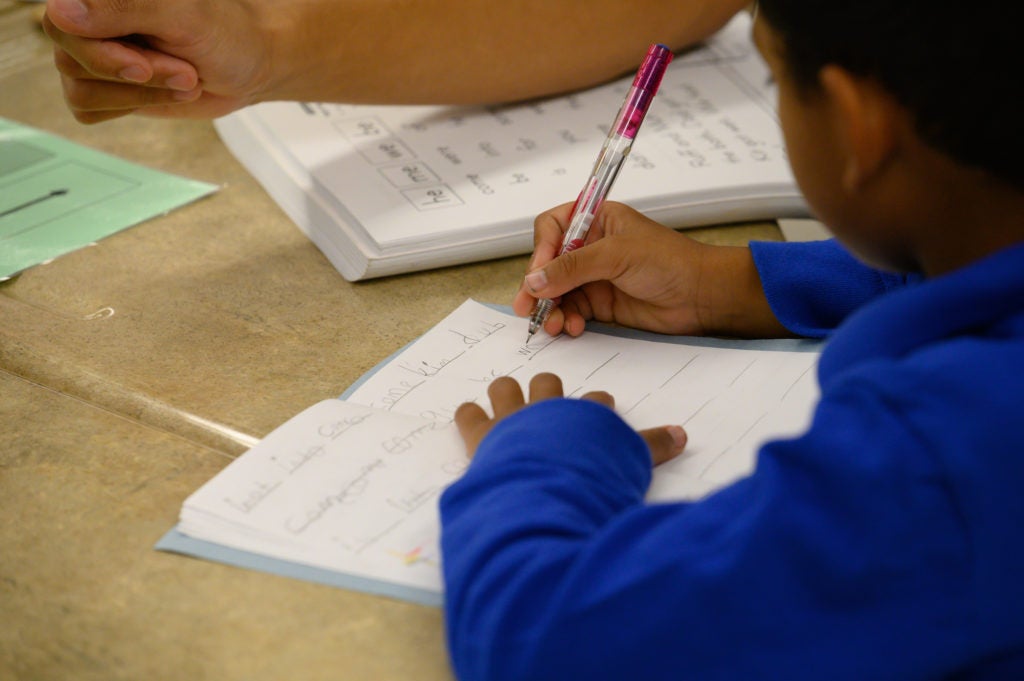By McKenna May, 2019-2020 Literacy First Tutor

I’m a first-year tutor with Literacy First, and with that comes some unique challenges. I had to figure out how to organize my desk, my role in the workplace dynamic, and how to connect with my students in the pursuit of reading. While I have ample experience with children – I’ve been a Sunday school teacher, a theatre director at a kid’s camp, a babysitter, and a children’s retail store worker. I’m good at making kids laugh, being silly, and having fun. But this new role as a tutor is a bit different. I have a lesson plan to follow and a structure to protect. Because at the end of the day, learning to read is hard work, and I want to facilitate that process for my students in the best way possible.
As with any relationship, my individual connections with students took a little time: they’d test some boundaries, I’d learn about their likes and dislikes, and we’d find different tactics that helped their learning process. Most of my students came out of their shell within a month. Except Amir.
Let me tell you what I know about Amir today. He is a very sweet first grade student, who doesn’t want anyone to know that. He’ll give up prize tickets to a sad friend so they can buy a prize for themselves. When I gave him a bookmark, he immediately picked one his mom would like so he could give it to her. He loves the Grinch and will laugh at my (very bad) impressions of that green scamp. And boy-oh-boy is he competitive, and if you find that spark in him, there is nothing he can’t do.
Now, let me tell you what I knew about Amir when we first started together: nothing. Yes, you read that right. Absolutely nothing. This student was an enigma. His shell wasn’t an eggshell, no, it was made out of titanium. Whenever I’d ask him how his day was, he’d shrug. At the end of every lesson, before I could say a proper goodbye, he would push in his chair and hurry back to class. Amir seemed bored by the parts of our lessons that came easily, and frustrated by the more difficult parts, but didn’t like repetitive practice.
I knew nothing about Amir and his learning style, and because of that, he wasn’t progressing as quickly as he could. I didn’t know what to do. I talked to my teammates and Supervisor and other educators in my life for tips on how to engage with this student so he would have a more fulfilling learning experience. They gave me good advice, and the first crack came when I made a joke. It was a simple, silly one that I can’t even remember now, but it made him giggle. That was the first time I’d seen him smile, and we had known each other for over two months at that point.
That little crack helped me get a sense that Amir needed a little bit of silliness to come out of his shell. So, we turned his word reading into a sort of game. We would time how fast Amir could read the words with no practice, then practice a whole lot and time him again. We’d even time me reading the words to see if he could beat me. The “game” made it fun for Amir, and seeing how much his reading improved really kept him motivated. There would be times he’d want to practice more than I made him.
The trust we built with being just a bit silly and playing “games” while learning created an environment where he felt comfortable enough to make mistakes, let me help him, and thus learn faster. Now, Amir is reading connected text at a second-grade level and is almost ready to graduate. I still don’t get a lot of responses when I ask about his day, but he does tell me about things he’s doing in class, and we joke about the Grinch whenever he comes up. Our relationship doesn’t look like the relationship with any of my other students, and that’s okay, because it’s unique.
We were reading a book together at the end of a recent lesson, and Amir looked at me and asked, “do you want to know why I picked this book?” We were reading the chapter book Captain Underpants by Dav Pilkey, so I assumed he had picked the book because it was funny. Still I asked, “Why’d you pick it?” “Because,” he said simply, “this is a hard book. If I read hard books, then I’ll become a better reader.” Then he turned back to the book and just kept reading. His answer both shocked me and filled me with pride! Amir didn’t need a sticker that day (even though he got one anyway), because he’s internalized the importance of reading, and that it is in and of itself a reward for our hard work together.
